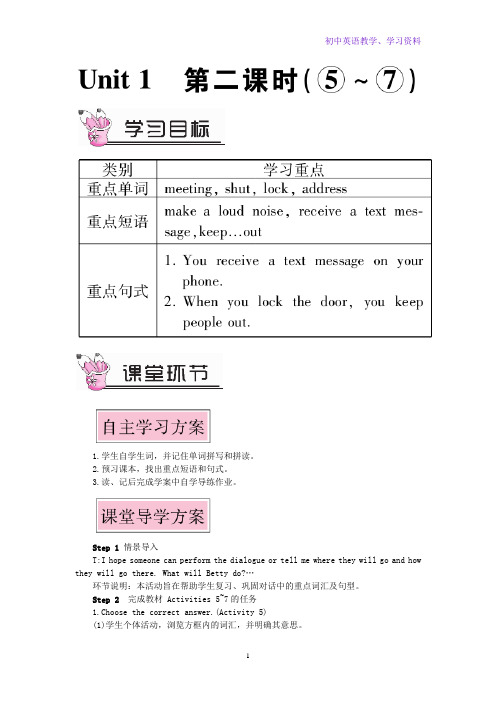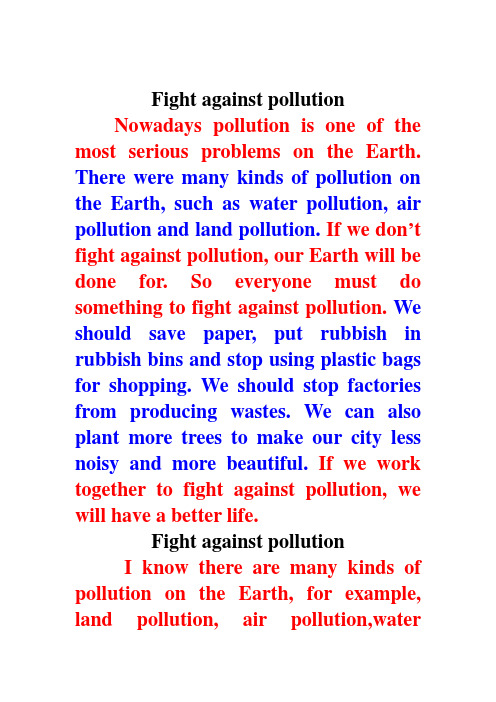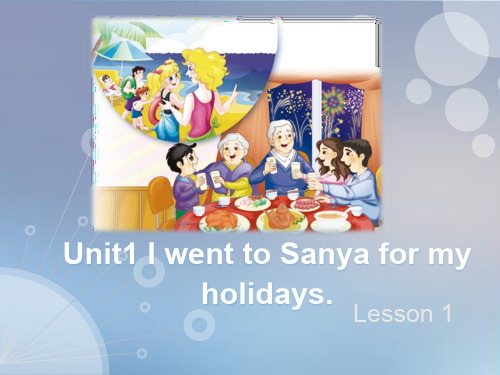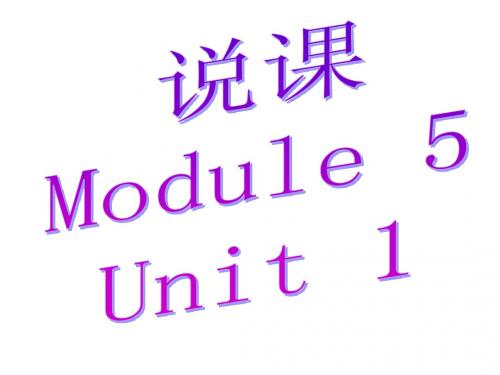U1(1)
- 格式:pdf
- 大小:648.89 KB
- 文档页数:12

1.学生自学生词,并记住单词拼写和拼读。
2.预习课本,找出重点短语和句式。
3.读、记后完成学案中自学导练作业。
Step 1情景导入T:I hope someone can perform the dialogue or tell me where they will go and how they will go there. What will Betty do?…环节说明:本活动旨在帮助学生复习、巩固对话中的重点词汇及句型。
Step 2 完成教材 Activities 5~7的任务1.Choose the correct answer.(Activity 5)(1)学生个体活动,浏览方框内的词汇,并明确其意思。
(2)仔细阅读每个语句,尤其注意理解上色部分的含义,然后根据语境作出选择。
(3)两人一组核对答案,然后全班核对。
(『答案』1.where we are staying 2.travelling by train 3.makes a loud noise 4.on your phone 5.closed 6.keep people out 7.work)环节说明:本活动为词汇运用活动,要求学生根据语境作出选择。
2.Listen and mark the words which the speaker links. Now listen again and repeat. (Activity 6)(1)学生听录音,找出每个单句中的连读部分,并标上连续符号。
(2)再次听录音,核实连读位置,反复朗读。
(3)两人一组活动,相互听读。
(4)教师点名,部分学生展示,全班反馈。
Pronunciation tipWhen a word ending in a vowel is in front of a word beginning with a vowel, we often add a /w/ or a /j/(like a “y”) to link the words more easily.环节说明:本活动旨在帮助学生培养在语句中根据词组或意群进行连读的能力。


Unit1 Canyouplaytheguitar ?元教学分析〔元教材分析和学生已有水平分析〕本元的中心是运用情自己在某一方面所具有的能力。
整个元的内容是情can展开的。
通本元的学,使学生能运用情can表达自己在某一方面所具有的才能,自己的喜好与意愿,能自荐或参加各种外俱部,并制作海,而且学会写出招聘广告.并学生在践中学会和使用目,鼓励学生极参加各种外活,培养学生的多方面才能及精神。
教学目〔以能做什么来描述〕:1〕知目:A 学重点:dance,swim,sing,play, chess paint,speakJapanese,playtheguitar,artmusic,guitar,drum,piano,,trumpet,violin B掌握情ca n 的肯定句和否认句、情can的一般疑句、特殊疑句及肯否认答复;学会制作招聘广告2〕能力目:学会运用情自己的喜好与意愿;运用情can自己在某一方面所具的才能;成立同学自己喜的各种俱部并其制作海。
3〕情感目:通践学生体学英的趣,并能勇于展示自己的才能,通小活彼此的特与好。
指学极与他人交流,相互学,相互帮助,培养精神。
划分:第一SectionA1a-1c第二SectionA2a-4第三SectionB1a-3c第四SectionBSelf-check3Period1SectionA一、教学目:目:usetheverbsofactivitysuchassing,dance,swim...abilities.expresspersonalabilitiesmastertheusageofthemodalverb"can"andverbphrasesexpressing二、知与技能:1.常的器(guitarpiano⋯)2.学会自己的能力.(swimsingdance⋯)三、程与方法:,小活言来源于生活,学本从而启学生在余培养其它方面的能力。

Fight against pollutionNowadays pollution is one of the most serious problems on the Earth. There were many kinds of pollution on the Earth, such as water pollution, air pollution and land pollution. If we don’t fight against pollution, our Earth will be done for. So everyone must do something to fight against pollution. We should save paper, put rubbish in rubbish bins and stop using plastic bags for shopping. We should stop factories from producing wastes. We can also plant more trees to make our city less noisy and more beautiful. If we work together to fight against pollution, we will have a better life.Fight against pollutionI know there are many kinds of pollution on the Earth, for example, land pollution, air pollution,waterpollution and so on . We should fight against pollution to protect the Earth. Trees are our best fighters against pollution because trees take harmful gases from the air and release oxygen back into the air. So we should plant more trees. We should stop factories from pouring polluted water into rivers. We should stop using plastic baggs for shopping. We should try our best to fight agsinst pollution and keep our Earth clean. And we should do these now before it is too late.。


教案课程名称通用英语1(本科版)课时班级专业教师系部教研室教材《通用英语1(本科版)》补充教学资源PART III READING参考译文长大后就离开了你我记不清自己当时多大,只记得当时很困惑。
小女孩嘛,都喜欢小女孩喜欢的那些事情。
但随着自己慢慢长大,我内心开始意识到,长大可能意味着要离开父母。
我和我的决定斗争了好几天。
我内心深处一部分想着留下,而另一部分渴望离开。
无论哪一部分都不愿伤害母亲的感情,可我明白,这终将不可避免。
每天晚上我睡觉的时候,我和妈妈会有一个睡前活动,这个习惯从我很小时就有了。
“抱抱我,像我抱你那样。
”我们相互打趣。
有时,拥抱简简单单;有时,需要一些超出常规的手臂动作,然后另一方必须正确复制。
“亲亲我,像我亲你那样。
”同样,有时候,是在脸颊上轻轻点一点的一个吻,而有时,是以某种特别的方式亲来亲去的吻,而另一方则要认真效仿。
我们这样坚持了多年。
然而,有段时间,我突然不想睡前再拥抱她、亲吻她。
我长大了,我想离开。
但是,该怎样向母亲挑明呢?接连数日,此事一直压在我的心头,直到有天晚上,趁母亲给我盖被子时,我全盘托出,说出了自己的想法。
那样的坦承,痛彻心扉,部分原因是它意味着我的童年时代的一部分结束了,还有部分原因是我知道这注定会伤害她。
但母亲却镇定自若,她理解。
我不知道她事后是否流泪伤心,我认为她可能会的。
因为现在我自己已为人母,终于理解父母看到孩子们长大后那种喜忧参半的复杂感情。
上周,儿子说,他朋友拿我给他午餐盒里塞便条的事来取笑他。
我告诉他,如果他不希望我放便条,我以后就再也不会写那些东西了。
尽管我有过与儿子同样的感受,但我还是突然意识到,他正悄悄离我远去。
虽然他说,我可以继续写便条,但我分明看到了他眼神中的那份挣扎,那是在不想伤害我的感情与他正在长大这一事实之间的挣扎。
长大与远去,可能是由于午餐盒里的便条,也可能是由于睡前的拥抱,还可能是由于他已长大而完全不再需要的别的东西。
M7 U1 词汇讲解+练习Part 1 单词拓展1.barely /ˈbeəli/ adv. 刚好;仅仅,勉强可能;几乎不;刚才拓展:当never, seldom, few, little, barely, hardly, scarcely, rarely, no, not 等含有否定意义的副词及其构成的短语放在句首,句子要用部分倒装,即把be动词/情态动词/助动词提至主语前面。
2.appointment /əˈpɔɪntmənt/ n. 约定,约会;任命,委任;职务拓展:appointment n.约会;预约;任命,委任→appoint vt.任命;委派;指定;约定→appointed adj.指定3.make one’s fortune 发财拓展:fortune n.大笔的钱,财富;运气→fortunate adj.幸运的→fortunately adv.幸运地→【反】misfortune n.不幸→unfortunate adj.不幸的;令人遗憾的→unfortunately adv.不幸地;令人遗憾地4.reliable /rɪˈlaɪəbl/ adj. 可信赖的,可依靠的;拓展:*rely vi. 依靠,依赖,信任,信赖→reliable adj. 可依靠的,可信赖的→【同】depend vi. 依靠,依赖,信任,信赖5.worthwhile /ˌwɜːθˈwaɪl/ adj. 值得花时间(或花钱、努力等),重要的,令人愉快的(2) 拓展:*worthy adj.配得上的→worth adj.值……→worthwhile adj.值得做的,值得花费时间/金钱的→【反】worthless adj. 没有价值的;没有用的练习:词条搭配意义和用法worthwhile It’s worthwhiledoing...It’s worthwhile to do...值得做……worth be worth+n.值得……,值……be worth doing“某事值得被做”,要用动名词的主动形式表示被动意义。
Module10 Unit1 精品教案【教学目标】●Knowledge objective1. Words: director, avoid, background, national, international, presenter, interview2. Expressions: on air, show sb. around, keep doing sth, do interviews with3. Grammar: the tense of the object clause●Ability objective能听懂和阅读关于介绍广播电台的语言材料,能从课文中明白如何实现理想,实现人生的价值;能编写有关广播的对话。
●Moral objective在课文文本的学习中,加强团队合作精神,调动学生的良性竞争意识;了解有关电台实况转播的要素,以及技术发明对人类文明发展的切实意义;了解当下名人成名的奋斗史,用理性的思维体会成功光环背后的努力勤奋与付出。
【教学重点】The tense of the object clauses.【教学难点】1. The tense of the object clauses.2. The use of “on air, avoid doing sth. and do an interview with sb.”.【教学方法】PWP method, task-based method and interactive approach【教学手段】A tape recorder, multimedia and some pictures【教学过程】Teaching Procedures:Step 1 Consolidate new wordsLook and say. The teachers shows the pictures of new words and let the students to Step 2 Leading-inSs look the pictures and answer the questions. Say as soon as possible.Step 3 Listening1. Listen Part 1 and check the types of news you hear.2. Listen again and complete the sentences.3. Listen to Part 3 and answer the following questions.1) What should we avoid doing in the background?2) Do they collect the lasted national and international news in the newsroom? Step 4 Reading1. Now complete the notes.2. Find out the object clauses in the dialogue.Step 5 Everyday EnglishLet Ss say the everyday English that they have learnt in the passage.Step 6 Language points1. I’m the news director at Radio Beijing.director “导演,主管,经理”。